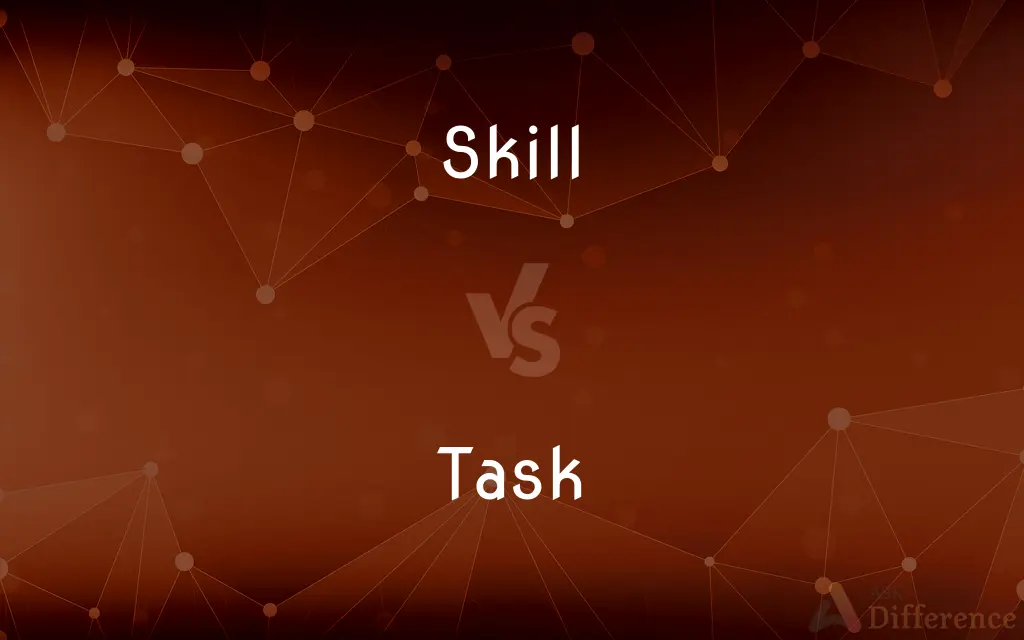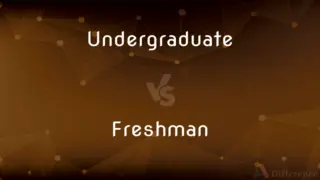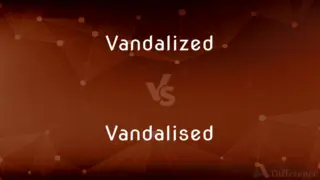Skill vs. Task — What's the Difference?
By Tayyaba Rehman & Maham Liaqat — Updated on April 15, 2024
Skill refers to the ability to perform tasks effectively due to knowledge or practice, while a task is a specific duty or job to be accomplished.

Difference Between Skill and Task
Table of Contents
ADVERTISEMENT
Key Differences
A skill is a developed ability or expertise in a particular area, often gained through training and practice. Whereas, a task is an activity or assignment that requires one to apply their skills to complete.
Skills are typically measured in terms of proficiency and improvement over time, reflecting an individual's competence in certain areas. On the other hand, tasks are usually specific and measurable objectives that have a clear beginning and end.
Skills can be broad and applicable to various tasks, such as critical thinking or problem-solving. Tasks, however, are often narrow in scope and have specific outcomes, like completing a report or solving a mathematical equation.
The development of skills is an ongoing process that can enhance an individual’s performance across multiple tasks. Tasks, however, are finite and serve as opportunities to apply and test these skills.
Skills can be transferable and used in different contexts or jobs. Tasks are usually specific to a particular context or project and do not necessarily transfer to other areas.
ADVERTISEMENT
Comparison Chart
Definition
Ability or expertise developed through practice.
Specific duty or job to be performed.
Measurement
Proficiency and improvement.
Completion and success of objective criteria.
Scope
Broad and applicable in various contexts.
Narrow, often specific to a single objective.
Duration
Ongoing development and refinement.
Typically finite with a clear endpoint.
Transferability
Often transferable across different tasks.
Usually specific and contextual to a particular job.
Compare with Definitions
Skill
Expertise in a specific field.
She has excellent interpersonal skills.
Task
A specific piece of work to be done.
Completing the annual report was his main task.
Skill
Capability measured by proficiency.
His technical skills were evident in the project's success.
Task
Duty assigned to someone.
She was given the task of training new employees.
Skill
Acquired ability through practice.
His cooking skills have improved significantly.
Task
Job or assignment to be undertaken.
The construction task was challenging.
Skill
Aptitude developed over time.
Developing leadership skills is essential for management.
Task
Objective to be achieved within a time frame.
Their task was to redesign the website.
Skill
Competence in a particular activity.
Her skill in data analysis is remarkable.
Task
Set of activities aimed at achieving a goal.
Organizing the conference was no small task.
Skill
A skill is the learned ability to perform an action with determined results with good execution often within a given amount of time, energy, or both. Skills can often be divided into domain-general and domain-specific skills.
Task
A piece of work assigned or done as part of one's duties.
Skill
Proficiency, facility, or dexterity that is acquired or developed through training or experience
Painted with great skill.
Task
A difficult or tedious undertaking
Finding qualified people to fill these specialized roles was a real task.
Skill
A developed talent or ability
Improved his writing skills.
Task
A function to be performed; an objective
It is our task to renew consumer confidence.
Skill
An art, trade, or technique, particularly one requiring use of the hands or body
The skill of glassmaking.
Task
To assign a task to or impose a task on
The agency was tasked with creating an advertising campaign.
Skill
(Obsolete) A reason; a cause.
Task
(Archaic) To subject to strain or hardship
"The Professor's household was a modest one, and yet it tasked his ideas to keep it up to his wife's standard" (Edith Wharton).
Skill
Capacity to do something well; technique, ability. Skills are usually acquired or learned, as opposed to abilities, which are often thought of as innate.
Where did you pick up that skill?
With great skill, she navigated through the tricky passage.
Doing that coaching course not only taught me useful skills on the field, but also some important life skills.
Task
A piece of work done as part of one’s duties.
The employee refused to complete the assignment, arguing that it was not one of the tasks listed in her job description.
Skill
(obsolete) Discrimination; judgment; propriety; reason; cause.
Task
Any piece of work done.
Skill
(obsolete) Knowledge; understanding.
Task
A difficult or tedious undertaking.
Skill
(obsolete) Display of art; exercise of ability; contrivance; address.
Task
An objective.
Skill
Great, excellent.
Task
(computing) A process or execution of a program.
The user killed the frozen task.
Skill
(transitive) To set apart; separate.
Task
(obsolete) A tax or charge.
Skill
To discern; have knowledge or understanding; to know how (to).
Task
(transitive) To assign a task to, or impose a task on.
On my first day in the office, I was tasked with sorting a pile of invoices.
Skill
To know; to understand.
Task
(transitive) To oppress with severe or excessive burdens; to tax
Skill
(intransitive) To have knowledge or comprehension; discern.
Task
(transitive) To charge, as with a fault.
Skill
(intransitive) To have personal or practical knowledge; be versed or practised; be expert or dextrous.
Task
Labor or study imposed by another, often in a definite quantity or amount.
Ma task of servile toil.
Each morning sees some task begin,Each evening sees it close.
Skill
To make a difference; signify; matter.
Task
Business; employment; undertaking; labor.
His mental powers were equal to greater tasks.
Skill
(video games) To spend acquired points in exchange for skills.
Task
To impose a task upon; to assign a definite amount of business, labor, or duty to.
There task thy maids, and exercise the loom.
Skill
Discrimination; judgment; propriety; reason; cause.
For great skill is, he prove that he wrought.
Task
To oppress with severe or excessive burdens; to tax.
Skill
Knowledge; understanding.
That by his fellowship he color mightBoth his estate and love from skill of any wight.
Nor want we skill or art.
Task
To charge; to tax, as with a fault.
Too impudent to task me with those errors.
Skill
The familiar knowledge of any art or science, united with readiness and dexterity in execution or performance, or in the application of the art or science to practical purposes; power to discern and execute; ability to perceive and perform; expertness; aptitude; as, the skill of a mathematician, physician, surgeon, mechanic, etc.
Phocion, . . . by his great wisdom and skill at negotiations, diverted Alexander from the conquest of Athens.
Where patience her sweet skill imparts.
Task
Any piece of work that is undertaken or attempted;
He prepared for great undertakings
Skill
Display of art; exercise of ability; contrivance; address.
Richard . . . by a thousand princely skills, gathering so much corn as if he meant not to return.
Task
A specific piece of work required to be done as a duty or for a specific fee;
Estimates of the city's loss on that job ranged as high as a million dollars
The job of repairing the engine took several hours
The endless task of classifying the samples
The farmer's morning chores
Skill
Any particular art.
Learned in one skill, and in another kind of learning unskillful.
Task
Assign a task to;
I tasked him with looking after the children
Skill
To know; to understand.
To skill the arts of expressing our mind.
Task
Use to the limit;
You are taxing my patience
Skill
To be knowing; to have understanding; to be dexterous in performance.
I can not skill of these thy ways.
Skill
To make a difference; to signify; to matter; - used impersonally.
What skills it, if a bag of stones or goldAbout thy neck do drown thee?
It skills not talking of it.
Skill
An ability that has been acquired by training
Skill
Ability to produce solutions in some problem domain;
The skill of a well-trained boxer
The sweet science of pugilism
Common Curiosities
Are tasks always practical in nature?
Tasks can be practical or theoretical, depending on the nature of the work or study.
What is the difference between a skill and a task?
A skill is an ability developed through experience, while a task is a specific job or duty to perform.
Can skills affect how tasks are performed?
Yes, proficient skills can improve the efficiency and quality of task completion.
How can one improve skills to perform tasks better?
Through continuous practice, training, and applying skills in various contexts.
How does improving skills impact task performance?
Improving skills enhances the efficiency, effectiveness, and quality with which tasks are performed, as higher skill levels allow for better problem-solving and execution abilities.
Can a task exist without any required skills?
While very simple tasks might require minimal skills, most tasks require at least some level of skill to be performed correctly and efficiently.
Are all tasks dependent on skills?
Most tasks require some level of skill, but the complexity and type of skill needed can vary.
What defines a skill compared to a task?
A skill is an ability or expertise gained through practice and experience, useful in various situations. A task is a specific duty or activity that needs to be completed, often requiring the application of certain skills.
Why is it important to differentiate between skills and tasks?
Understanding the difference helps in planning personal development and organizational roles more effectively, ensuring that the right skills are developed to meet the demands of specific tasks.
How can one identify which skills are needed for a particular task?
One can identify necessary skills by analyzing the task’s requirements, the challenges it presents, and the desired outcomes, then matching these with skill sets that effectively address these elements.
Share Your Discovery

Previous Comparison
Undergraduate vs. Freshman
Next Comparison
Vandalized vs. VandalisedAuthor Spotlight
Written by
Tayyaba RehmanTayyaba Rehman is a distinguished writer, currently serving as a primary contributor to askdifference.com. As a researcher in semantics and etymology, Tayyaba's passion for the complexity of languages and their distinctions has found a perfect home on the platform. Tayyaba delves into the intricacies of language, distinguishing between commonly confused words and phrases, thereby providing clarity for readers worldwide.
Co-written by
Maham Liaqat













































